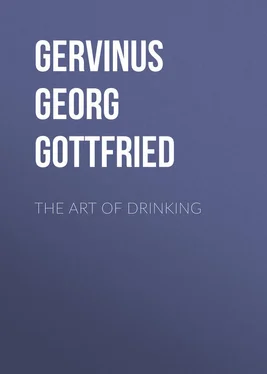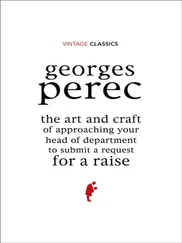Georg Gervinus - The Art of Drinking
Здесь есть возможность читать онлайн «Georg Gervinus - The Art of Drinking» — ознакомительный отрывок электронной книги совершенно бесплатно, а после прочтения отрывка купить полную версию. В некоторых случаях можно слушать аудио, скачать через торрент в формате fb2 и присутствует краткое содержание. Жанр: foreign_antique, foreign_prose, на английском языке. Описание произведения, (предисловие) а так же отзывы посетителей доступны на портале библиотеки ЛибКат.
- Название:The Art of Drinking
- Автор:
- Жанр:
- Год:неизвестен
- ISBN:нет данных
- Рейтинг книги:3 / 5. Голосов: 1
-
Избранное:Добавить в избранное
- Отзывы:
-
Ваша оценка:
- 60
- 1
- 2
- 3
- 4
- 5
The Art of Drinking: краткое содержание, описание и аннотация
Предлагаем к чтению аннотацию, описание, краткое содержание или предисловие (зависит от того, что написал сам автор книги «The Art of Drinking»). Если вы не нашли необходимую информацию о книге — напишите в комментариях, мы постараемся отыскать её.
The Art of Drinking — читать онлайн ознакомительный отрывок
Ниже представлен текст книги, разбитый по страницам. Система сохранения места последней прочитанной страницы, позволяет с удобством читать онлайн бесплатно книгу «The Art of Drinking», без необходимости каждый раз заново искать на чём Вы остановились. Поставьте закладку, и сможете в любой момент перейти на страницу, на которой закончили чтение.
Интервал:
Закладка:
Georg Gottfried Gervinus
The Art of Drinking / A Historical Sketch
G. G. Gervinus (1805-1871) is recognized as one of the foremost historians of Germany. He was a man of marvelous erudition. His fame rests not only upon a great number of profoundly learned works, but also upon his brilliant advocacy of the constitutional rights of the people, as against the reactionary tendency of the German princes during Metternich’s despotic rule. He was one of the seven celebrated professors of the University of Göttingen who boldly protested against the violation of the Constitution by the King of Hanover. His best-known works are “History of the Poetical Literature of the Germans,” “History of the Nineteenth Century,” and a voluminous commentary on Shakspeare, “made popular in England” – as the Encyclopædia Britannica states – “by an excellent translation.”
The following sketch was designed by Gervinus as an outline of what a history of potology would be, if conceived and executed by a philosophical mind.
An English translation of this sketch needs no justification in our time.
A sketch of the art of drinking might seem to announce a subject unworthy of a man whose energies have been devoted to earnest purposes and serious aims in life. But it is not my intention to make the sketch a mere treasure-box of all sorts of curiosities, nor to gratify thereby the curiosity of idle readers. When it is approached from a scientific standpoint, the dignity of science must necessarily exclude all frivolous treatment, as well as all shallow and superficial purpose. Many would be satisfied if an insignificant sketch of this kind simply bore some pathetic motto, as these words of Seneca’s: Animum aliquando debemus relaxare et quibusdam oblectamentis reficere; sed ipsa oblectamenta opera sint. I, however, would scorn a justification of this kind, for I hold that recreation ought to be recreation, and not work, and should consider it far better if our labors were pleasures, rather than our pleasures, labors.
I wish in this sketch to point out the importance and serious significance of a work of this sort, and shall have, above all, to prove that the apparently somewhat jocular subject has a very serious side, and may be contemplated from a grave standpoint.
If I succeed from the very first in inducing the reader to adopt the same historical view of the matter that I take myself, I shall have gained a great point, for he will then lay aside all prejudice and preconceived opinion. The real historian must be a stranger to all prejudice and preconceived opinion; he cannot treat of any subject separately, but is attracted by everything in a certain order and connection. He must not choose any subject from personal inclination, but according to the needs and demands of his time and of human society; nor must he treat the chosen subject with that pathological interest and sympathy so common among the writers of the New World. He must understand and know, from historical experience, that in times like ours, which have outgrown the activity of imagination – that is to say, Art – and, on the other hand, are not yet ripe for speculation – that is to say, Philosophy , – universal observation, which includes all departments of human activity, is the only thing that in these very times and for this generation can furnish positive information and prove a certain gain. The real historian, whose profession it is to be equally interested in everything, thus becomes an image of impartiality. The impartial observer is attracted by all phenomena, and to him nothing appears small, insignificant or unimportant, as soon as he begins to draw conclusions from his observations and to discover laws in the physical as well as the moral world. In the world of reason there exists nothing small, accidental or unimportant. If the same laws of chemical combination govern immense masses of matter as well as the smallest atom, if the march and development of mankind are the same as those of the most insignificant individual, the observation of the smallest as well as the greatest is of equal importance, and man may well feel comfort in the fact that each hair upon his head is, indeed, numbered. This alone might refute any serious objection to my theme.
A history of oinology or potology would be able to show that man, in satisfying a partly physical and partly intellectual desire, is bound by the same laws that govern him in the satisfaction of the highest needs of his striving mind. And if this be the case, the theme might be considered worthy of being chosen by the most severe scientific moralist; and matters of this kind are apt to be overlooked only because other things appear comparatively more important. There is a history of wine and wine-drinking (for of these alone I speak), because it is connected with our spiritual development. Wine itself shows a certain element of development and perfectibility – a relation to organic life in its fermentation, and a sympathetic feeling, as it were, in its movement during the period of the blooming of the vine, while in the plant itself it shows an inner development. I have just called wine-drinking a partly physical, partly intellectual enjoyment, and it is almost impossible to call up the image of any social gathering or entertainment without it. And since all human culture proceeds from the manners and forms of society and social intercourse, we would plainly see in such a history – what has often been divined and pointed out, but also frequently smiled at – that wine is most closely connected with the civilization of States and with the development of free human culture, and that the art of drinking at all times keeps step with this culture and development, and sinks or rises with them. For not at all times have men practiced this art with equal wisdom, nor yet even practiced it in like manner; and there is spiritual progress from the blood-thirsty revels of Ægisthe to those of the philosophers with Plato; from the cup-bearer Hephæstos to Hebe and Ganymede; from the heavy, dull metal cup to the transparent, rounded crystal glass, in Lucian’s time, or our own, which shows the color, retains the perfume and promotes sound. As the culture of the grape is only found where a higher human civilization has begun to develop, it also shows itself at once where a new civilization appears; it may be even in regions unfavorable to it, where it is only cultivated till wine has become so great a want that it can no longer be dispensed with, despite the lack of sufficient native production. The first cultivators of the vine, history praises as benefactors of mankind and propagators of civilization. Noah was the elect of God, in spite of the improprieties produced by his wine; old Dionysos, for all the ravings of his service, a kindly god; and Urban, of the Middle Ages, a saint, although he committed the greatest misdeeds under the influence of wine. And wherever, on the other hand, in more enlightened history, a man took an active part in the development of human civilization, he did so also instinctively, it would seem, for that of wine – be it a Heracles Ipoctonos among the Erythræans; or an Alexander, who, with his Greek culture, brought the grape-vine back to hot Babylon; or a Charles IV., who, with his Italian education, wished to force it upon cold Bohemia. We shall see that wherever hierarchical constitutions deprived the people of the advantages of education, the wisdom of the priests was subtle enough to forbid wine too, and the course of the Mohammedan hierarchy will show us most plainly how the art of drinking brought with it bold reformatory deviations from the laws. We shall observe, even with Christian nations, how, among certain races where the use of wine was confined to the Communion table, civilization also came to a stand-still.
Читать дальшеИнтервал:
Закладка:
Похожие книги на «The Art of Drinking»
Представляем Вашему вниманию похожие книги на «The Art of Drinking» списком для выбора. Мы отобрали схожую по названию и смыслу литературу в надежде предоставить читателям больше вариантов отыскать новые, интересные, ещё непрочитанные произведения.
Обсуждение, отзывы о книге «The Art of Drinking» и просто собственные мнения читателей. Оставьте ваши комментарии, напишите, что Вы думаете о произведении, его смысле или главных героях. Укажите что конкретно понравилось, а что нет, и почему Вы так считаете.










